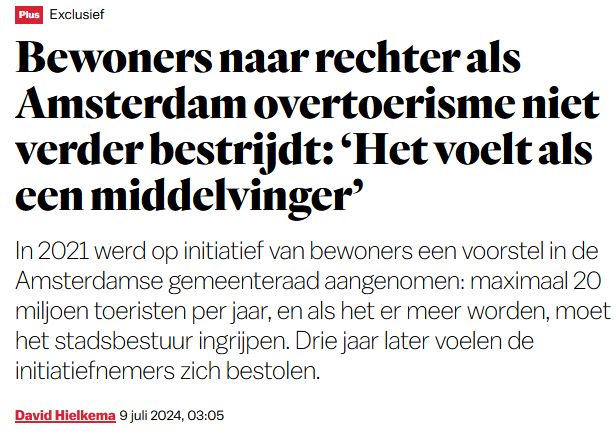
Initiators of "Amsterdam has a choice" consider legal action

What exactly is going on?
In 2021, following the residents' initiative "Amsterdam has a choice," which collected more than 30,000 signatures, Amsterdam adopted the "Tourism in Balance" ordinance. This ordinance set a strict limit of 20 million on the maximum number of overnight stays. If that limit is exceeded, the city must take measures to reduce the number below that limit.
What is happening now
The number of hotel overnight stays (excluding Airbnb, bed and breakfast, and other non-hotel stays) was already 20.7 million in 2023, well above that limit. The municipality has taken "action" in response. A series of measures (fewer river cruises, fewer ocean cruise ships, no new hotels) have been announced, but anyone familiar with the issue knows that these will certainly not reduce the number below 20 million overnight stays. And the initiators are (rightly) angry about this. They believe that the municipality is not effectively implementing the obligations set out in the ordinance and are prepared to go to court to force the municipality to do more.
What does "do more" mean?
They advocate for a significant increase in the tourist tax, aiming for a total increase of 30%, in steps of 6% annually. The tourist tax in Amsterdamis already one of the highest in the world, with a rate of 12.5% on the net overnight price. Assuming a 30% increase, not percentage points, the final rate would be 16.25%. A very high rate, but the impact on the number of tourists may not be sufficient. A net overnight stay of 250 euros would then cost just over 290 euros instead of 281 euros. Yes, it would be more expensive, but a traveler staying 3-4 days in Amsterdam is unlikely to stay away because of 9 euros more per night. Perhaps it is meant that the tourist tax should be increased by 30 percentage points? Then the final rate would be 42.5% (!!) and the same overnight stay would cost a whopping 356 euros. That will undoubtedly make a difference, though the question remains how much.
A different approach
Personally, I think that a 30 percentage point increase will prove unfeasible, if only because such a rate (except in Bhutan) is charged nowhere else in the world and its reasonableness will immediately be challenged. I think that restricting access to public spaces, as if with digital access passes, will ultimately be the future. No pass? Then no possibility to buy tickets for museums, concerts, attractions, sights, etc. This would reduce the attractiveness of the visit itself and force tourists, rather harshly, towards other choices. Ungracious? Perhaps a bit, but the current situation undoubtedly requires unconventional choices.




